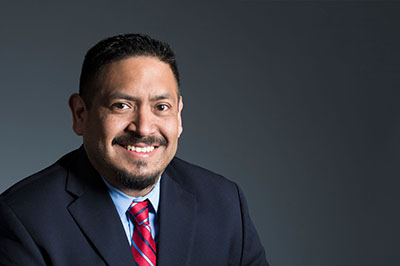ARTICLE FAST FACTS
The Pursuit of Equal Educational Opportunity: A Historical Analysis of the South Texas/Border Initiative
Author: Vincent D. Carales, assistant professor
Department: Educational Leadership & Policy Studies
Co-author: Erin E. Doran
Journal: Educational Policy
Publication date: Aug. 21, 2020
Topic: higher education funding and student access
Overview: A review of the 1987 lawsuit that improved higher education opportunities for Mexican Americans in South Texas and the border regions
INTERVIEW WITH THE AUTHOR
What is the purpose of the article?
The article is based on the LULAC v. Richards case, a lawsuit against the state of
Texas. Plaintiffs argued they were being discriminated against, in regard to access
to and funding in higher education in the historically underserved South Texas and
border regions, where a huge portion of the Latino population in Texas resided. The
plaintiffs initially won the case, but it was overturned in the Texas Supreme Court.
However, the lawsuit contributed to the South Texas Border Initiative, and $880 million
of higher education funding was granted to the universities in this region.

Why did you write this article?
I was trying to show how if you come together and fight for equity you could have
an impact on access to higher education, funding and equal opportunity. I also wanted
to showcase the legacy this initiative had and what happens when poorly resourced
institutions are able to fight for their fair share of funding and access from the
state.
Can you describe the research process?
Rather than conduct interviews, we looked through archival data. The primary document
we analyzed was a 233-page report from the Legislative Joint Committee on Higher Education
in South Texas. The plan moving forward is to conduct more research by actually talking
to individuals who were involved in the case as well as community leaders who advocated
on behalf of their respective communities to tell their stories and document this
historic and landmark event in our state’s higher education history.
What were your most significant findings?
The region had been complaining about inequities in higher education for quite some
time. State leaders had previously acknowledged this was an issue but didn’t do anything
until the problem was publicized when the lawsuit came out. It took a concerted effort
from community leaders and organizations to address these social inequities that had
been occurring for decades.
What are the social implications of this work?
When you come together to fight a common enemy — educational poverty and inequity
— you can accomplish your goals. In some ways, you’re seeing that in society today,
with all the different social justice movements happening.
Why is this subject important to you?
The subject is important to me because it impacts the Latino population. I am of Mexican
American descent, so it was personal to me. This is our history. It is important to
tell stories and struggles of our people. You’re not going to find this case in traditional
forms of history books that are written primarily by white men.
What will you research next?
I’ve got a lot of projects in the works. Right now, I’m looking at how Latino students
perceive their student loan debt and the repayment process and how these perceptions
impact their goals after college.
— By Lillian Hoang